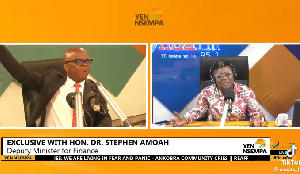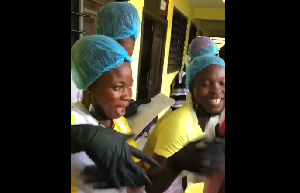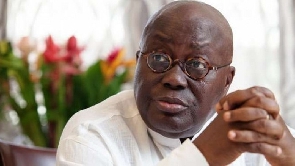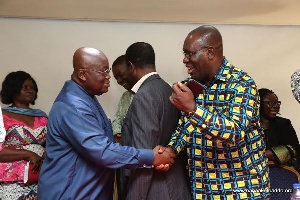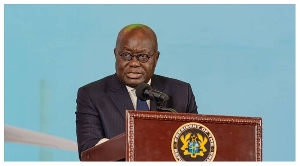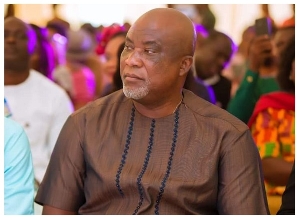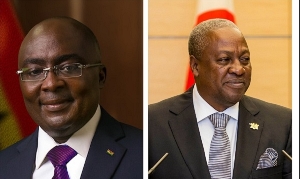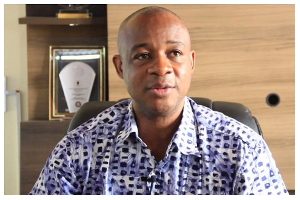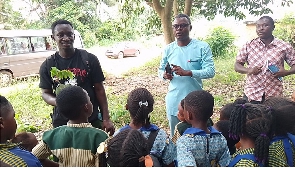 Basic pupils receiving education on tree species
Basic pupils receiving education on tree species
Dr. Dickson Adom, a lecturer at the Department of Educational Innovations in
Science and Technology at the Kwame Nkrumah University of Science and Technology, Ghana, has partnered with Yvette Harvey-Brown of the Botanic Gardens Conservation International (BGCI), United Kingdom to develop a pedagogical model for teaching native tree species using Ghanaian indigenous knowledge systems for environmental sustainability education in Ghana.
The project received funding from the Botanical Gardens Conservation International, U.K. with a project ID GTC/2023/15.
Following the development of the Indigenous Knowledge Inspired Model, which is referred to as the ESBIK pedagogical model by the research team, it was implemented within four months starting on September 1, 2023, and ending on December 7, 2023.
The model relied on indigenous songs, myths, proverbs, and cosmological belief systems surrounding the native tree species as a medium of instruction to help learners develop native tree recognition skills, and their medicinal, economic, cultural, religious, and spiritual relevance, making a strong case for their conservation. It relied on the plant content in the Ghanaian elementary school
curriculum.
The implementation of the pedagogical model in classroom activities involved the use of elderly persons with indigenous knowledge about native tree species as well as practical hands-on learning pivoted on constructivism and inclusive learning approaches.
Also, it involved field trips to nature reserves and nature walks within the various localities of the selected schools for learners to have firsthand experience with the native tree species.
Activities that were undertaken in these outdoor learning activities included participatory art activities of native trees, preparation of seedbeds, soil mixes, nursery containers, seed handling/storage, seedling care, tree planting, and native tree identification exercises.
The school administrator of Royal Nikkies Academy at Kodie in the Ashanti Region
of Ghana intimated that: "The ESBIK pedagogical model is a very innovative and important methodological tool for elementary school teachers in Ghana to help in the transfer of relevant knowledge in native tree species enabling the learners to be well-versed in their indigenous knowledge systems while deepening their appreciation and resolve to protect their environment".
Dr. Adom, the lead researcher on this project mentioned that consciously teaching students about their native tree species using indigenous knowledge content and teaching approaches would decolonize the curriculum on plant content of elementary school learners in Ghana from the domination of western knowledge.
While these attempts were minimal involving two elementary schools namely the Royal Nikkies Academy and Akrofrom D/A Primary schools in the Kodie District, Ashanti Region, the research team is determined to secure a grander grant to expand the implementation of the IK-inspired pedagogical model for environmental sustainability education in the elementary schools across the 16 regions of the country.
The Kodie District Director of Education, David Akomeah Asokwah lauded the initiative and thanked BGCI (U.K.) for providing funds for the project which he said would charge the elementary school learners in his district to be more conscious of their native tree species, imbibing in them pro-environmental behaviours while charging them to take practical actions in conserving the remnant native tree species in their respective localities.
Likewise, the school administrators, elementary school teachers, elementary school learners, and some local community members expressed positive comments about the implementation of the model and were determined to continue its
implementation after a sustainability plan was discussed with them by the research team on December 7, 2023.
The activities of the project were supported by Benjamin Ossom and John Akomatey from the Department of Wildlife and Range Management in the K.N.U.S.T., Dr. Michael Ato Essuman, a textbook content expert and a former consultant on Textbook content development and evaluation at the National Council for Curriculum and Assessment (NaCCA) and now a lecturer in the Department of
Publishing Studies, K.N.U.S.T.
Others included Dr. Martin Gyekye Ampofo, a leading member of the Our World and Our People Curriculum and lecturer in the Department of Educational Innovations in Science and Technology, K.N.U.S.T.

